God is my conscience, Jesus lives in my heart… this blog is about what I see, what I think, what I do and how I serve God
Approximate Notes for Sunday’s Message.
Scriptures for this coming Sunday: Romans 12:1-2, (3-13)
You can read these Scriptures here: NIV and ESV
Hymns for Sunday:
UMH 140 – Great Is Thy Faithfulness
UMH 393 – Spirit of the Living God (@ WUMC only)
UMH 77 – How Great Thou Art
This is a last sermon in a series titled “Church, Community, Culture.”
Here is a list of sermons in this series with a link.
We discussed the Samaritan Woman at the Well few weeks ago. Here is a link to that sermon: {Click Me}

Today we will conclude the “Church, Community, Culture” series.
Most recently as we talked about HOW our church, our community and our culture interact, we have spent some time with the Samaritan Woman at the Well (a.k.a. Svetlana) and with Cornelius.

When Svetlana first encountered Jesus, she was argumentative and even tried to pick fights with him[1]. We saw that Jesus did not argue with her; instead Jesus offered her understanding and grace.
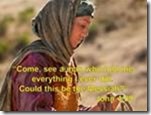
As a result she asked herself an important question, “Could this man that I am talking to now be the Messiah? Is he the real deal or a fast talker?” (John 4:29 paraphrase).
{Illustration}
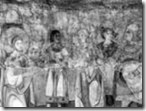
Cornelius, on the other hand, was curious and he had to humble himself to learn about God.
{Illustration}

By contrast, Peter had to find the courage to go into the house of Cornelius and share a roof and meals with him.
{Illustration}
So what’s in it for us? What is the “so what?” in all of this. What can we learn from this exercise and how can we apply it to our spiritual, personal and professional lives.

I often hear people talking about the church as an institution rather than a group of people who love God and strive to live out their love and devotion to God by serving the world in which we live. Our culture reduced the church to a place that we visit on Sunday instead of a group of people who live out their faith and devotion to God daily in the way that we interact with the world around us.
It is A.D. 2015 and our world needs spiritual leaders who can ask tough questions and be willing to seek the answers (like Svetlana/ “you will know the truth and the truth will set you free” (John 8:32).), humble themselves (like Cornelius) and fearlessly face challenges of the day (like Peter).
Church has been in people building business and leadership development business for a long time. That is one of the ways that the Church serves God. Our churches are uniquely positioned for equipping men and women to become principled leaders and members of our society who passionately pursue their lives’ callings, be it a call to become a plumber, an accountant, a farmer, a NASA engineer, or a president of the United States of America. The Church has some experience doing that: we did it with a various degrees of success for 2,000 of years.
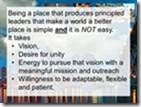
Being a place that produces principled leaders that make a world a better place is simple and it is NOT easy. It takes vision, desire for unity [to be of “one accord” (Acts 1:14 KJV)], energy to pursue that vision with a meaningful mission and outreach and willingness to be adaptable, flexible and patient. That is, in part, how we “offer [ourselves] as a living sacrifice, holy and pleasing to God.” That is how, in part, we are “transformed by the renewing of [our] {collective} mind.” That is how we discern what God is doing in the world around us, so that our actions could reflect that discernment (Romans 12:1-2).
Paul gave the Church of Rome, some solid instructions on how to accomplish all that. These instructions are still relevant to us today (reading from Romans 12).

3 For by the grace given me I say to every one of you: Do not think of yourself more highly than you ought, but rather think of yourself with sober judgment, in accordance with the faith God has distributed to each of you.
{Illustration: This verse is about humility. I want to add that humility is not low self-esteem because we are not called to be doormats; humility is about low self-preoccumation, aft}.
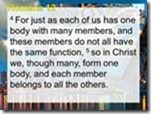
4 For just as each of us has one body with many members, and these members do not all have the same function, 5 so in Christ we, though many, form one body, and each member belongs to all the others.

6 We have different gifts, according to the grace given to each of us. If your gift is prophesying, then prophesy in accordance with your faith; 7 if it is serving, then serve; if it is teaching, then teach; 8 if it is to encourage, then give encouragement; if it is giving, then give generously; if it is to lead, do it diligently; if it is to show mercy, do it cheerfully.

9 Love must be sincere. Hate what is evil; cling to what is good.

10 Be devoted to one another in love. Honor one another above yourselves.

11 Never be lacking in zeal, but keep your spiritual fervor, serving the Lord.
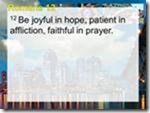
12 Be joyful in hope, patient in affliction, faithful in prayer.

13 Share with the Lord’s people who are in need. Practice hospitality.

A long time ago Micah preached in one of his sermons, “… and what does the LORD require of you but to act justly and to love mercy and to walk humbly with your God” (Micah 6:8 NKJV). To echo this, Arthur Ashe, a humanitarian and one of tennis’ greats said, “Start where you are. Use what you have. Do what you can.”
The words of Micah and Arthur Ashe are separated by 3,000 years of human history, yet both sentences crystalize our lives’ journeys down to their essential elements. We are free from the burden of perfection and we are created to strive for a closer relationship with God with every day of our lives.

[1] “You are a Jew and I am a Samaritan. Why are you even talking to me?” (John 4:9 paraphrase) /// “We worship on mount Gerizim and you worship on mount Moriah. You worship wrong” (John 9:20 paraphrase)
















